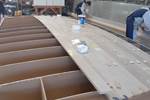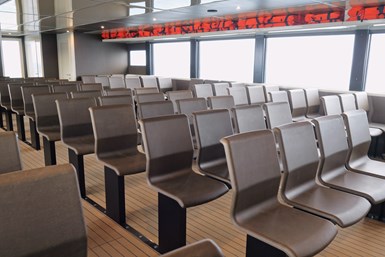AmpliTex-constructed solar-powered ferry hits the Adriatic Sea
The Marservis PROeco is a mass transportation marine vessel using Bcomp natural fiber for interior parts in place of standard materials.
Bcomp Ltd. (Fribourg, Switzerland) announces that an eco-catamaran, partially built with Bcomp’s flax fiber composite ampliTex, has begun ferrying passengers around the Port of Rovinj in the Adriatic Sea this summer. The solar-powered PROeco vessel is the result of a 2-and-a-half-year collaboration between Bcomp and Croatia-based marine manufacturer Marservis (Kaštelir).
Bcomp’s biocomposite was used in the construction of almost all of the vessel’s non-structural and semi-structural components, including the bulkheads, seats, ceiling and side linings, as well as some parts of the floor. These parts were manufactured by combining ampliTex laminates with infusion bio-based epoxy resin through vacuum infusion and a resin transfer molding (RTM) process.
With capacity for 100 passengers and two crew, the PROeco is being used on short, defined routes for more than 10 hours daily. The use of electric motors saves 770 kilograms of diesel emissions each day, and the incorporation of bio-based materials — used in place of standard fiberglass, polyester and vinyl ester — has also reduced emissions related to the manufacture of those fossil fuel-derived materials.
“By combining renewable energy with natural fiber composites, this vessel represents the advent of a new stage in eco-friendly mass mobility on waterways,” says Paolo Dassi, Bcomp marine and industry manager. “Not only does it reduce energy demands and emissions related to manufacturing, but it also allows for substantial impact reduction throughout the vessel’s operational life.”
Test panels made of the Bcomp composite were subjected to mechanical property tests in cooperation with the University of Zagreb’s Faculty of Mechanical Engineering and Ship Building. AmpliTex is also being used by Marservis for the Aquapod+, an autonomous device used to collect floating waste from ports, and the ECOcube, an autonomous floating reception station for solid and liquid wastes from vessels.
Marservis produces vessels up to 20 meters in length. In the last few years, the company has been testing and implementing natural materials, creating a natural composite suitable for building vessels. Furthermore, the company includes electric drives in its products, and the necessary energy is obtained from alternative sources, primarily from photovoltaic.
Related Content
-
Natural fiber composites: Growing to fit sustainability needs
Led by global and industry-wide sustainability goals, commercial interest in flax and hemp fiber-reinforced composites grows into higher-performance, higher-volume applications.
-
Airbus works to improve the life cycle of composites in future aircraft
This companion article to CW's September 2024 Airbus Illescas plant tour discusses recycling, LCA, biocomposites, Fast Track technologies, qualification and more.
-
Bcomp ampliTex makes appearance in Cupra EV Cup Bucket seats
The entire Cupra Born VZ line-up features all-natural fiber front seats that highlight functionality, aesthetics and reduced CO2 emissions.

















